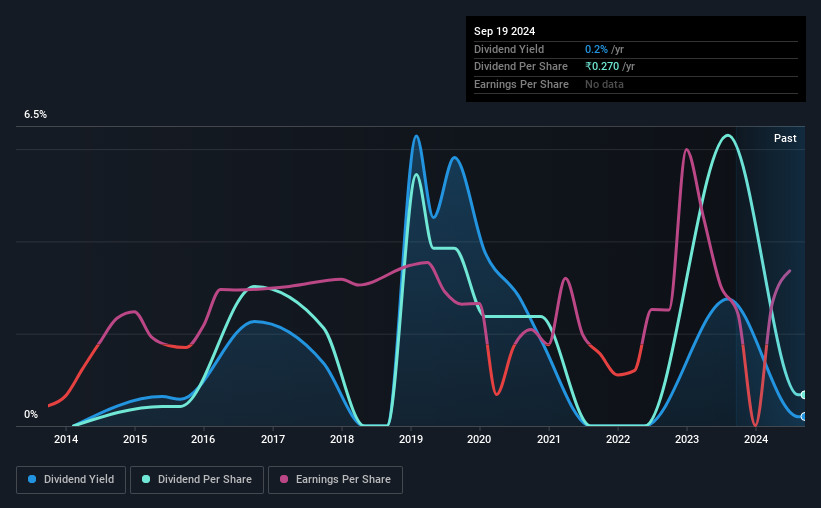National Fertilizers (NSE:NFL) Is Reducing Its Dividend To ₹0.27

National Fertilizers Limited (NSE:NFL) has announced that on 26th of October, it will be paying a dividend of₹0.27, which a reduction from last year's comparable dividend. This payment takes the dividend yield to 0.2%, which only provides a modest boost to overall returns.
Check out our latest analysis for National Fertilizers
National Fertilizers' Projected Earnings Seem Likely To Cover Future Distributions
While yield is important, another factor to consider about a company's dividend is whether the current payout levels are feasible. However, National Fertilizers' earnings easily cover the dividend. This means that most of its earnings are being retained to grow the business.
Looking forward, earnings per share could rise by 6.7% over the next year if the trend from the last few years continues. Assuming the dividend continues along recent trends, we think the payout ratio could be 4.9% by next year, which is in a pretty sustainable range.

National Fertilizers' Dividend Has Lacked Consistency
Even in its relatively short history, the company has reduced the dividend at least once. This makes us cautious about the consistency of the dividend over a full economic cycle. The annual payment during the last 9 years was ₹0.17 in 2015, and the most recent fiscal year payment was ₹0.27. This works out to be a compound annual growth rate (CAGR) of approximately 5.3% a year over that time. We have seen cuts in the past, so while the growth looks promising we would be a little bit cautious about its track record.
National Fertilizers Could Grow Its Dividend
Growing earnings per share could be a mitigating factor when considering the past fluctuations in the dividend. It's encouraging to see that National Fertilizers has been growing its earnings per share at 6.7% a year over the past five years. Growth in EPS bodes well for the dividend, as does the low payout ratio that the company is currently reporting.
Our Thoughts On National Fertilizers' Dividend
Even though the dividend was cut this year, we think National Fertilizers has the ability to make consistent payments in the future. The payout ratio looks good, but unfortunately the company's dividend track record isn't stellar. The payment isn't stellar, but it could make a decent addition to a dividend portfolio.
It's important to note that companies having a consistent dividend policy will generate greater investor confidence than those having an erratic one. Still, investors need to consider a host of other factors, apart from dividend payments, when analysing a company. Case in point: We've spotted 2 warning signs for National Fertilizers (of which 1 is potentially serious!) you should know about. If you are a dividend investor, you might also want to look at our curated list of high yield dividend stocks.
If you're looking to trade National Fertilizers, open an account with the lowest-cost platform trusted by professionals, Interactive Brokers.
With clients in over 200 countries and territories, and access to 160 markets, IBKR lets you trade stocks, options, futures, forex, bonds and funds from a single integrated account.
Enjoy no hidden fees, no account minimums, and FX conversion rates as low as 0.03%, far better than what most brokers offer.
Sponsored ContentValuation is complex, but we're here to simplify it.
Discover if National Fertilizers might be undervalued or overvalued with our detailed analysis, featuring fair value estimates, potential risks, dividends, insider trades, and its financial condition.
Access Free AnalysisHave feedback on this article? Concerned about the content? Get in touch with us directly. Alternatively, email editorial-team (at) simplywallst.com.
This article by Simply Wall St is general in nature. We provide commentary based on historical data and analyst forecasts only using an unbiased methodology and our articles are not intended to be financial advice. It does not constitute a recommendation to buy or sell any stock, and does not take account of your objectives, or your financial situation. We aim to bring you long-term focused analysis driven by fundamental data. Note that our analysis may not factor in the latest price-sensitive company announcements or qualitative material. Simply Wall St has no position in any stocks mentioned.
About NSEI:NFL
National Fertilizers
Engages in the production and marketing of neem coated urea, bio-fertilizers, and other allied Industrial products in India.
Acceptable track record second-rate dividend payer.
Similar Companies
Market Insights
Community Narratives


